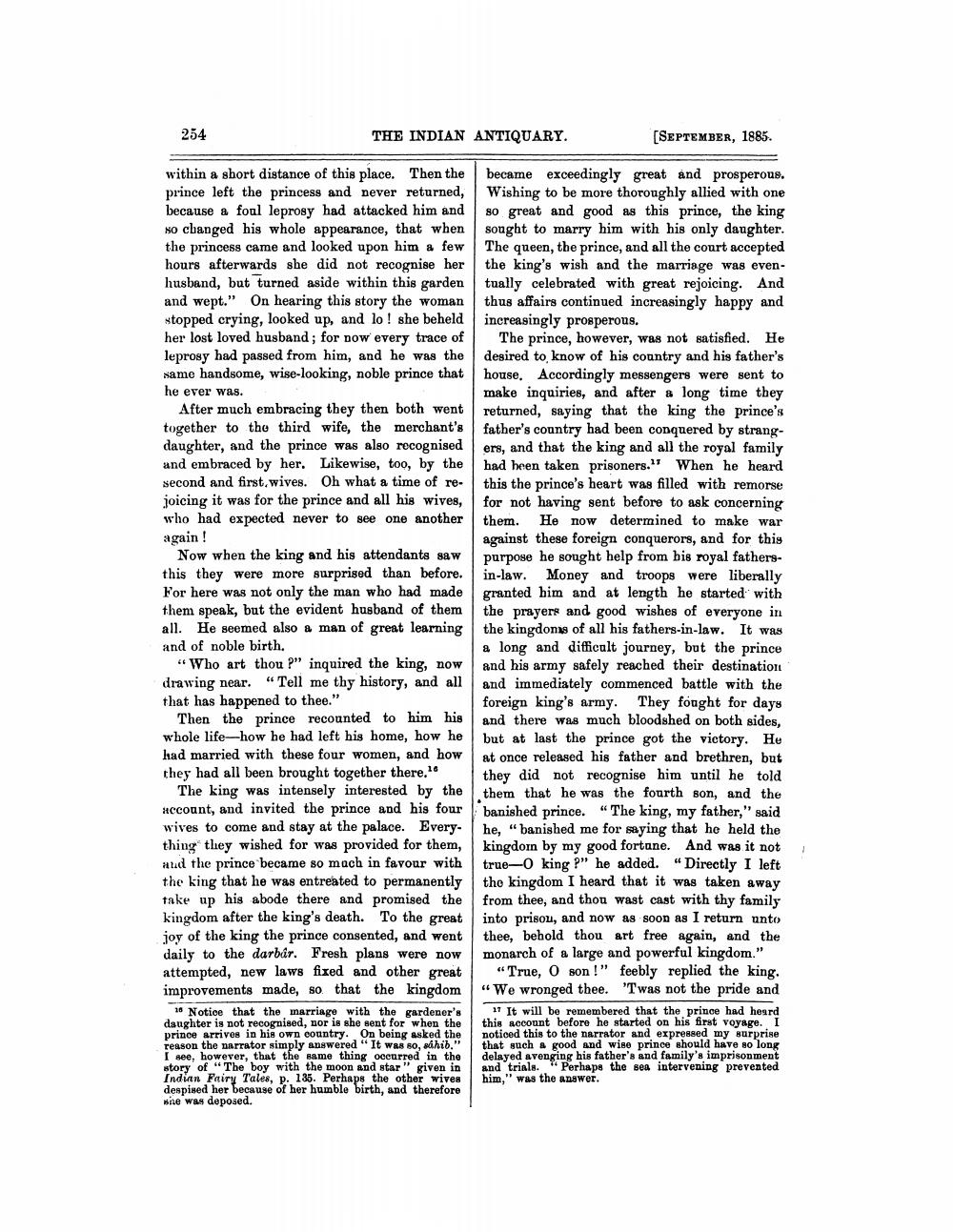________________
254
THE INDIAN ANTIQUARY.
[SEPTEMBER, 1885.
within a short distance of this place. Then the prince left the princess and never returned, because a foul leprosy had attacked him and so changed his whole appearance, that when the princess came and looked upon him a few hours afterwards she did not recognise her husband, but turned aside within this garden and wept." On hearing this story the woman stopped crying, looked up, and lo! she beheld her lost loved husband; for dow' every trace of leprosy had passed from him, and he was the same handsome, wise-looking, noble prince that he ever was.
After much embracing they then both went together to the third wife, the merchant's daughter, and the prince was also recognised and embraced by her. Likewise, too, by the second and first wives. Oh what a time of rejoicing it was for the prince and all his wives, who had expected never to see one another again!
Now when the king and his attendants saw this they were more surprised than before. For here was not only the man who had made them speak, but the evident husband of them all. He seemed also a man of great learning and of noble birth.
“Who art thou P” inquired the king, now drawing near. “Tell me thy history, and all that has happened to thee."
Then the prince recounted to him his whole life-how he had left his home, how he had married with these four women, and how they had all been brought together there.
The king was intensely interested by the account, and invited the prince and his four wives to come and stay at the palace. Every thing they wished for was provided for them, and the prince became so much in favour with the king that he was entreated to permanently take up his abode there and promised the kingdom after the king's death. To the great joy of the king the prince consented, and went daily to the darbár. Fresh plans were now attempted, new laws fixed and other great improvements made, so that the kingdom
16 Notice that the marriage with the gardener's daughter is not recognised, nor is she sent for when the prince arrives in his own country. On being asked the reason the narrator simply answered " It was 60, adhib." I see, however, that the same thing occurred in the story of "The boy with the moon and star" given in Indian Fairy Tales, p. 135. Perhaps the other wives despised her because of her humble birth, and therefore site was deposed.
became exceedingly great and prosperous. Wishing to be more thoroughly allied with one 80 great and good as this prince, the king sought to marry him with his only daughter. The queen, the prince, and all the court accepted the king's wish and the marriage was eventually celebrated with great rejoicing. And thus affairs continued increasingly happy and increasingly prosperous.
The prince, however, was not satisfied. He desired to know of his country and his father's house. Accordingly messengers were sent to make inquiries, and after a long time they returned, saying that the king the prince's father's country had been conquered by strangers, and that the king and all the royal family had been taken prisoners." When he heard this the prince's heart was filled with remorse for not having sent before to ask concerning them. He now determined to make war against these foreign conquerors, and for this purpose he sought help from bis royal fathersin-law. Money and troops were liberally granted him and at length he started with the prayers and good wishes of everyone in the kingdons of all his fathers-in-law. It was a long and difficult journey, but the prince and his army safely reached their destination and immediately commenced battle with the foreign king's army. They fought for day! and there was much bloodshed on both sides, but at last the prince got the victory. He at once released his father and brethren, but they did not recognise him until he told them that he was the fourth son, and the banished prince. “The king, my father," said he, “banished me for saying that he held the kingdom by my good fortone. And was it not true- king ?” he added." Directly I left the kingdom I heard that it was taken away from thee, and thou wast cast with thy family into prisou, and now as soon as I return unto thee, behold thou art free again, and the monarch of a large and powerful kingdom."
"True, O son!” feebly replied the king. “We wronged thee. 'Twas not the pride and
17 It will be remembered that the prince had heard this account before he started on his first voyage. I noticed this to the narrator and expressed my surprise that such & good and wise prince should have so long delayed avenging his father's and family's imprisonment and trials. Perhaps the sea intervening prevented him," was the answer.




